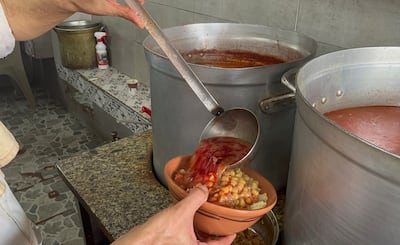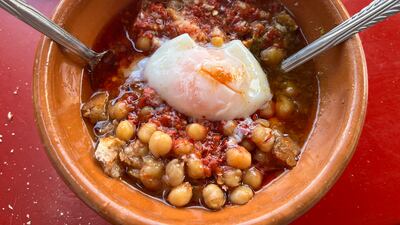As you walk through the buzzing market of Tunis' central Beb El Jazira neighbourhood, a subtle smell of blending spices will fill your nostrils, followed by the unmistakable feeling of your mouth beginning to water. There is only one thing that could satisfy you now, and it's available at the oldest restaurant in town – Tunisia’s iconic lablabi.
Almost 100 years ago, Weld Hanifa opened its doors to customers, later becoming a destination not only for Tunisians but for people from around the world who come to visit just to taste the late Hammadi Droura's recipe.
Served in a ceramic bowl, the dish is mainly made of chickpeas, broken pieces of old bread, a broth rich with Tunisian spices and a sprinkle of olive oil, the never-absent harrisa (a red pepper and garlic-based paste) and a half-cooked egg on top.
It could also be served with harguma sauce, made of lamb head and trotter meat, tuna and occasionally, seafood.
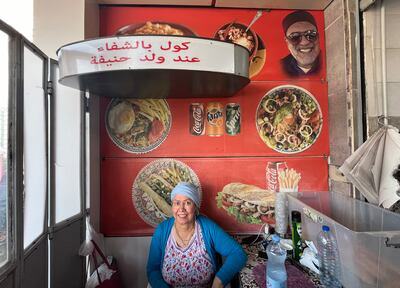
Speaking to The National as she was serving her clients and setting the table, Mr Droura’s daughter-in-law Rachida says there is no other country in the world that could serve lablabi like Tunisians do; it is a dish that only Tunisians know the secrets of.
“The word might be Turkish and was inspiration from the chickpea-only lablabi they serve, but it can in no way be compared to or have similarities to ours,” she said.
Ms Droura says that their tiny restaurant has received some of the most famous artists that the Arab world has ever known, including icons like Egyptian singer Oum Kalthoum and the sensational Abdel Halim Hafez.
But as much as she takes pride in these names having been their customers, she is mostly proud of the connections their lablabi has been able to create between people regardless of the social classes that fade away once they sit on the same table to eat it.
“This meal does not differentiate between the poor and the rich. From big company directors, artists to construction workers and simple housewives, everybody eats here and they are mostly welcomed,” Ms Droura says.
“Even if you do not have the money, no one gets out of here hungry, that is my father in law’s will that we want to preserve.”
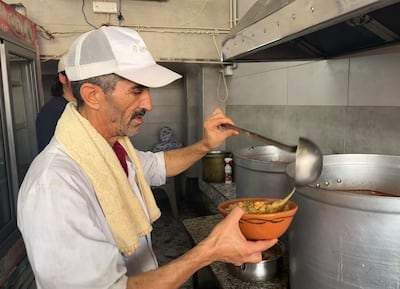
According to Sonia Hamzaoui, a culinary expert from the National Heritage Institute, all food in Tunisia, including lablabi, are the product of all the civilisations that came through.
“Even the idea that lablabi is of Turkish origin remains a hypothesis, our culinary heritage is so rich that it is impossible to identify a single source for it,” Ms Hamzaoui told The National.
Throughout its history, Tunisia has been conquered by many, including the Romans, Byzantine, Vandals, Arabs and Ottomans, all of whom had influence on many of the country’s modern daily life aspects.
“We have recipes that even date back to the Punic period, every dish could be inspired from many cultures but the way we cook dishes today cannot be compared to how the rest of the world makes it,” she says.
“Dishes such as Lablabi, Mloukhia and even the famous couscous are so different and are certainly a testament to the uniqueness and richness of our culinary heritage.”
“It is impossible for our lablabi to be imitated; our harissa is incomparable and our olive oil is known for its quality around the world,” Ayari, who has been cooking lablabi for the past 40 years at Weld Hanifa’s restaurant told The National as he was pouring a savoury broth made of harissa and spices that he did not want to specify as he considers it his special secret.
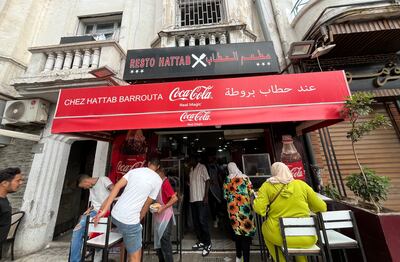
The chefs at the Weld Hanifa restaurant in Ben Al Jazira are certainly not the only famous Lablabi makers in town.
Uncle Hattab Barrouta – as many Tunisians call him – owns a restaurant just a few steps from the busy metro station, several high schools and offices. A diverse crowd across several generations has created memories here, including myself.
“My relationship with lablabi is a relationship of reminiscence to my beautiful childhood years with my late father, when we used to go to uncle Hattab to get lunch when he finished work,” Intissar Gassara, 31, told The National.
“Lablabi also represents the homeland … popular dishes are a definition and a representation of our Tunisian identity that distinguishes us from the rest of the Arab world,” Ms Gassara says.
“Lablabi will never vanish, I hope that this food will never lose its authenticity due to modernity, it is something we should preserve regardless of time.”
The love that Tunisians have for their culinary habits, namely lablabi, is the symbol of a simple need that all humans share; creating connections built around love, family and friends – and a national pride like no other.
“This shop is built on love, the love of believers among each other, the love for merciful acts and a love for the notion of family,” Ms Droura says.
